Ralph Lumley's Blog
December 11, 2018
New Artwork – Baby Shower
Here’s a homemade baby shower card I created.

The post New Artwork – Baby Shower appeared first on Uncanny Expeditions.
December 4, 2018
Sarcasm = Bad Communication
When I was a sophomore in high school, I discovered the wonderful tool of sarcasm got me a lot of laughs. Mercilessly I cracked jokes with a sarcastic bent, snapping out quick responses and glib comments. It’s one of the few memories I clearly retain from those days. Why? Because at some point I became aware of the emotions of the people who were the butt of my jokes, the focus of my sarcasm. They weren’t laughing. The pain in their eyes was easy to see. That’s when I understood that sarcasm wasn’t beneficial, but harmful.
I quit the practice and now use it only sparingly. I find it’s the worst form of comedy to employ. Oscar Wilde said, “Sarcasm is the lowest form of wit.” Yet it is pervasive throughout our culture.
What is Sarcasm?
The Dictionary defines sarcasm as harsh or bitter derision or irony, a sharply ironical taunt; a sneering or cutting remark. Harsh.Bitter. Derisive. Taunting. Sneering, Cutting. Other dictionaries provide similar descriptive adjectives: mocking, contemptuous, scorn, and insult. None of those words sound good or healthy for a relationship.
 Photo by rawpixel.com from Pexels
Photo by rawpixel.com from PexelsThe New Dictionary of Cultural Literacy gives the following definition: A form of irony in which apparent praise conceals another, scornful meaning. For example, a sarcastic remark directed at a person who consistently arrives fifteen minutes late for appointments might be, “Oh, you’ve arrived exactly on time!”
If you seek out the origin of the word, it comes from the Greek sarkazein, which means literally to strip off the flesh, as if one were violently flaying a piece of meat.
Yes, but is it really harmful?
Practically, if one is on the receiving end, sarcasm is not much fun. Speeli.com summarizes why sarcasm is bad with the following list. You can explore the expanded explanations at their site, I am just including the main points here.
It makes people feel bad.It could be misinterpreted.It creates tension.It could be a sign of hate.Hostility disguised as humor.It could be a sign of mental instability.It’s one form of bullying.It prevents meaningful communication.It will make matters worse.It might show lack of empathy.It can ruin self-esteem.People will consider you mean.It can make you a coward.
Clifford Lazarus described the usefulness of sarcasm in relationships in his article on the Psychology Today website. He states, “If you want to be happier and improve your relationships, cut out sarcasm since sarcasm is actually hostility disguised as humor.”
 Photo by Vera Arsic from Pexels
Photo by Vera Arsic from PexelsLIFEadvice Coach Kim Giles at KSL.com lays out six common reasons you might be using sarcasm:
You put others down to make yourself feel superior.You use it to ask for what you really want,instead of asking directly.Passive-aggressive anger.Life’s disappointments and suffering.You were teased and put down as a child. Now it’s payback.You like attention through humor.
But, it’s funny!
It can be, but it’s the same thing over and over: double talk. It’s saying one thing while really meaning another. It’s political-speak. It is untruthful and relies on the hearer to successfully understand the innuendo and make the mental connections to get to the real crux of what the person is trying to say.
But comedians use it all the time! Yes, they do, but not exclusively, unless you’re David Spade and I think everyone in Hollywood has now figured out he’s a one-trick pony. That’s all he can do.
Is there a place for sarcasm? Only in a dark world where people are unwilling to stand up and honestly speak the truth and are not interested in building a real relationship. Some Universities in Australia are threatening to ban sarcasm, which while I agree it’s not an edifying form of communication, it shouldn’t be banned. People should have the right to speak whatever they wish without constraints.
So, it’s really a question of are you being polite or not? Loving or not? Or just being critical.
References
Dictionary.com, LLC Editors (2018). The Definition of Sarcasm. Retrieved from http://www.dictionary.com/browse/sarcasm
The New Dictionary of Cultural Literacy, Third Edition Copyright © 2005 by Houghton Mifflin Harcourt Publishing Company. Published by Houghton Mifflin Harcourt Publishing Company. All rights reserved.
Online Etymology Dictionary, Editors (2018). Origin and meaning of sarcasm by Online Etymology Dictionary. Retrieved from https://www.etymonline.com/word/sarcasm#etymonline_v_22734
KSL.com, Kimberly Giles (June 16, 2014). What does sarcasm say about you? Retrieved from https://www.ksl.com/?sid=30323210
The Daily Wire, Kassy Dillon (November 16, 2018). Dillon:
Australian Universities are threatening to ban sarcasm, and I am offended.
Retrieved from https://www.dailywire.com/news/38440/dillon-australian-universities-are-threatening-ban-kassy-dillon
The post Sarcasm = Bad Communication appeared first on Uncanny Expeditions.
November 16, 2018
A Quick Scene Recreation
I needed an example to show my students, and I needed one fast.
One of the projects for my class, the students have to recreate a shot from a movie or TV show. Most of the time, they came up with some decent shots without anything other than written directions, but I wanted to provide a visual example this time.
But what to use? It was really a no-brainer. LEGOs, of course.
I decided to recreate this shot from Star Wars Episode IV – A New Hope. Ben and Luke have just met Han and Chewie and negotiated the price for their travel to Alderaan.

So I went to my LEGO collection, found the proper figures, and grabbed a few bricks to use as a background. Then I dug out a few LED lights to illuminate the scene. Finally, I grabbed my DSLR and set to work to find the right camera angle.
This is the end result.
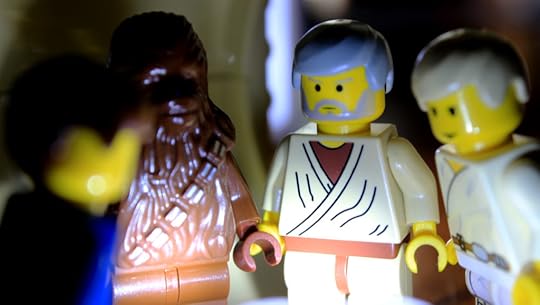
Not too bad for 10 minutes of effort. Here’s a photo of my setup, too.
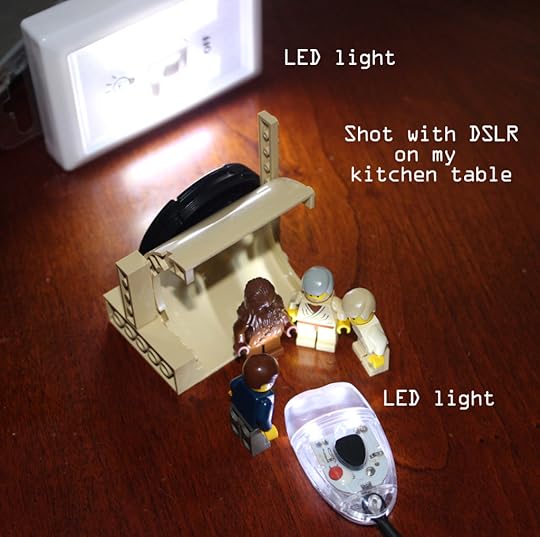
Try your own shot recreation!
The post A Quick Scene Recreation appeared first on Uncanny Expeditions.
November 10, 2018
London Fog
My wife and I celebrated our recent anniversary with a trip to Amish country. At the top of our list of places to visit was Wallhouse Coffee Company. Located in Sugarcreek OH, this unique coffee shop’s menu consists of coffee, tea, burritos, paninis, yoguccino and ice cream. What’s not to love?
 Wallhouse Coffee Company, Sugarcreek Ohio
Wallhouse Coffee Company, Sugarcreek OhioBurritos in a Coffee Shop?
We timed our arrival to be near lunch time in order to try the burritos. We both ordered a chipotle chicken burrito, which were really good: tasty with a hint of hotness.
The London Fog
When we initially ordered I discovered something new. There was a listing under the teas column called London Fog. Being of English descent and loving all things tea, I had to ask about this mysteriously named item.
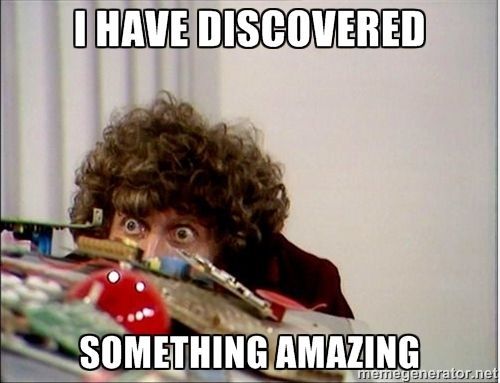
The barista described it to me as a cup of Earl Grey with steamed and frothed milk poured into it and a splash of vanilla syrup. Interesting. I sat down after receiving the drink, full of anticipation. With my first sip I was sold. Mind blown. Taste buds thrilled.
 London Fog (stock photo).
London Fog (stock photo).
One of the struggles I occasionally run into with tea is the sheer watery nature of it. Sometimes I want something thicker, or with more density, just to change things up. The London Fog was a beautiful blend of two worlds.
Ice Cream in a Coffee Shop?
To finish out our adventure at Wallhouse, my wife tried the ice cream. She ordered the Chocolate Toffee Espresso. Basically it was chocolate ice cream with toffee chunks doused with an espresso shot. She loved it and while I thought it was good, the espresso proved overpowering. Coffee really isn’t my thing.
Final Thoughts
After experiencing all that Wallhouse has to offer, it has become our favorite place to go. It is worth it to make our hour-long trek to this great destination. Now if they would only build one closer. Their hours are 7am-10pm Monday through Friday, and 8am-10pm Saturday. They are closed Sundays.
Check out Wallhouse in Sugarcreek OH. It gets a 5-kudos rating in our book!
 Inside Wallhouse. The hot-air roaster is seen on the right side.
Inside Wallhouse. The hot-air roaster is seen on the right side. A screenshot of the Wallhouse website.
A screenshot of the Wallhouse website.The post London Fog appeared first on Uncanny Expeditions.
November 2, 2018
Time Travel via Daylight Savings
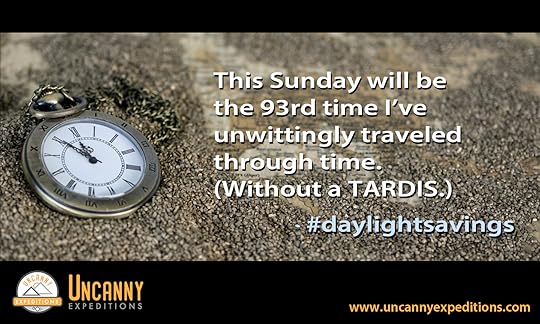
It took a bit of math to figure this out, but there you have it.
The post Time Travel via Daylight Savings appeared first on Uncanny Expeditions.
October 24, 2018
Doctor Who and the 13th Doctor: an Analysis
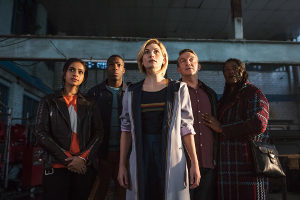 By Source (WP:NFCC#4), Fair use, https://en.wikipedia.org/w/index.php?...
By Source (WP:NFCC#4), Fair use, https://en.wikipedia.org/w/index.php?...
We are now three episodes in to the new season of Doctor Who where we are introduced to the well-publicized first female regeneration of the 13th Doctor Who, played by Jodi Whitaker. When she was first announced as the Doctor, the decision assured me, as Whitaker delivered a strong performance in Broadchurch. Now, after three episodes, it seems she is fighting an uphill battle and the DW creative crew is doing her no favors. (More on that later.)
Episode One
The first episode, “The Woman Who Fell to Earth,” throws you into the mix of events with little explanation and lots of questions, a good storytelling approach. Jodi’ s Doctor is a flurry of energy (literally) and confusion as she struggles to sort herself out. All of the chattiness and quickly delivered dialogue is very reminiscent of David Tennant’s 10th Doctor, but when she does her own thing, it feels forced, as if she’s trying way too hard to deliver this performance. We have no idea what parameters Chris Chibnall gave Jodi in which to define her character. As Tom Baker put it when he was the Doctor, he received no instruction, so he wasn’t acting, he was being himself. Perhaps we need more Jodi and less of a nebulous idea of who this new Doctor is.
(Spoiler alert coming up! Stop reading if you haven’t seen the second episode yet.)
Episode Two
 By Source (WP:NFCC#4), Fair use, https://en.wikipedia.org/w/index.php?...
By Source (WP:NFCC#4), Fair use, https://en.wikipedia.org/w/index.php?...
The second episode, “The Ghost Monument,” immediately drops the Doctor and her trio of companions into a do or die survival scenario, thus spending much of the time trying to stay alive and not developing the character of the Doctor. Then we discover the true purpose of the journey was to reunite the Doctor with her TARDIS. The whole episode feels like an extension of the first one, or just another step to help put the pieces in place to get the audience where we’re used to being: with the Doctor and her companions in the TARDIS exploring the universe and getting into trouble.
An annoying element about this episode was, as one critic complained, too many dialog along the lines of “Oh, look, a door!” or “A tunnel!” or “That’s a hologram!” (my examples, not actual quotes from the story). Then, after the Doctor says, “Oh look, a locked door, how ominous,” THEY NEVER SHOW THE DOOR. This is perhaps the worst editing I’ve ever seen on a professional production. Every good editor knows you show the audience rather than tell them. So what happened? Did a cameraman forget to film the door? Did the production team forget to build the door? Was this improved on set? This, combined with the completely disjointed scene of the heroes running away from robots shooting laser bolts at them, made for some really bad continuity errors on the part of the editing team.
Episode Three
 By Source (WP:NFCC#4), Fair use, https://en.wikipedia.org/w/index.php?...
By Source (WP:NFCC#4), Fair use, https://en.wikipedia.org/w/index.php?...
In “Rosa,” the third episode, the writing and directing team delivered a sensitive story with a skillful and steady hand. The well written dialog and the underplayed ending really worked for a historical journey to preserve Rosa Parks’ famous protest on a bus in Alabama. I really went into this episode with trepidation, expecting a heavy-handed dose of liberal righteousness. I only cringed once, when seeing the short clip of Bill Clinton awarding Rosa the Congressional Medal of Honor, which had more to do with him, than her.
The ending in which the Doctor explaining everything that happened in Rosa Parks’ life after the bus incident was a bit over the top. Did the Doctor just happen to know this information? If so, why did she seem ignorant of other details earlier in the episode? Did she look up the rest of Rosa’s life in the TARDIS databanks? If so, which would have made for a better scene, why not have her reading about it from a console instead of passionately telling the others their own history?
Looking at the episode technically, what’s the deal with all the extreme close ups? The camera is way too close in many shots, especially when the Doctor faces off against the villain. A close up can create forced intimacy with the audience, but if it’s too close all I can think of is, “Way big face!” and the opposite happens, I distance myself.
Conclusion
Overall, I’m comfortable with the three episodes so far and Jodi is doing an acceptable job, which brings me back to my initial comments about the creative team’s decisions not doing her any favors.
First, if you do a search for Jodi online, you’ll find a ton of photos of her with various hairstyles which really compliment her beauty, but this haircut they gave her for the Doctor is terrible, including the color. I hoped (as was the Doctor, I’m sure) she would have been ginger, as she in Broadchurch.
Second, her outfit is atrocious.
Third, her sonic screwdriver, which luckily they only show briefly, supposedly resembles a spoon, though as many on the internet have pointed out, looks a lot more like something else.
Fourth, the new TARDIS interior has a few cool items, such as the hologram of the police box, but overall it seems very gloomy and cramped in the control room.
On a good note, all the companions are good. I especially enjoy Bradley Walsh’s character, Graham. He consistently delivers a relatable and sensitive character.
The post Doctor Who and the 13th Doctor: an Analysis appeared first on Uncanny Expeditions.
June 28, 2018
THE ULTIMATE LEGO STAR WARS MILLENNIUM FALCON CHALLENGE

If you’re like me you were probably thrilled when LEGO released its first Ultimate Star Wars Millennium Falcon (set 10179) in 2007 consisting of 5,195 pieces. I was amazed, not only at the details but also the price tag, which then was around $500. Nowadays you can find it on ebay for $2000 plus. I didn’t have the money back then to spend on such an extravagance.
Then LEGO released the new and updated Ultimate Star Wars Millennium Falcon (set 75192) in 2017 with 7,541 pieces. This time, the price tag is around $800 and sadly, I still don’t have that kind of extra cash laying around.
BUT, what I do have is a massive collection of LEGOs I’ve amassed since the days of my childhood. I began to wonder… what if I could build this set from the pieces I already own?
When I began this project, I was going to build the 10179 version. I pulled all of the pieces needed together in one box and realized I hadn’t even made a dent in my collection. Woah. Then I decided to upgrade my project to the newer 75192 set.
You can download the instructions from the LEGO site here. You’ll find a list of all the necessary pieces in the back of the building manual. (Here’s the link to the 10179 version, too, in case you want to build that one.)
So here is the challenge:
You have to build your Millennium Falcon from the pieces you already own. You will be tempted to order the missing parts you don’t have, but don’t give in! Improvise and see what you come up with! Everyone’s set will look different and original. Let your creativity flow!
Send your pics and I’ll post them!
Build brilliantly!
LEGO and the LEGO logo are trademarks of the LEGO Group.
©2017 The LEGO Group.
Star Wars & Millennium Falcon © &  Lucasfilm Ltd., Disney
Lucasfilm Ltd., Disney
The post THE ULTIMATE LEGO STAR WARS MILLENNIUM FALCON CHALLENGE appeared first on Uncanny Expeditions.
To Whom are You Accountable?

Accountability is probably something you don’t think of often. Let’s look at the definition…
Accountability: noun. The state of being accountable, liable, or answerable.
Great. Now what does accountable mean?
Acountable: adjective. Subject to the obligation to report, explain, or justify something; responsible; answerable.
Have you ever considered that your life is accountable to someone? Sure, in our workplace we may intellectually understand we are accountable to our boss or supervisor, but beyond the reward of getting paid, what benefit is there? Or can more be gleaned from accountability?
Those who are married should consider they are accountable to their spouse. This should apply to all areas of life.
In Christian circles, there’s the “theory” of accountability. If one is struggling, others can come alongside and offer encouragement and support. Personally, though, I’ve found this to be conditional as to what you’re struggling with. If it’s too difficult a topic or, God forbid, require any significant amount of time to work through, these good-hearted helpers fade away and stop inquiring into your dilemma. I believe this has more to do with them not being properly equipped or trying to fit into a niche they don’t belong in just because no one else is available. But I digress.
More often than not, I encounter people who simply don’t consider themselves accountable to anyone. Their parents are tolerated, but in regards to life issues, ignored. They tend to operate by making decisions on their own, without consulting anyone who may be more experienced or wiser. They do what they want to do and never give a thought to consequences.
So, to whom do these individuals look up to? Is there anyone in their close circle of friends and family they actually respect enough to listen to their opinion? Or are they only revering the “famous” few who spew their opinions on twitter, of which the likelihood of actually meeting them is slim to none? I just don’t know.
Where does God fit into all this? Surely, the all-knowing Lord of the Universe should know what is best for us, right?
Some people seem to think they’re an expert on who God is without any reference to what the Bible says, or what the Church teaches, should they even attend. This is nothing new. We all tend to fashion God after the best and most familiar model we know of: ourselves. When we fashion Him in that image, it’s easy to believe how He could unconditionally accept everything we do. And if He should, Heaven forbid, challenge us on our thoughts, opinions or activities, well, then we practice the age-old technique of stiffening our neck, squelching our conscience, and rationalizing our position.
But isn’t God’s opinion the only valid view? Who are we to declare to Him what is right and what is wrong? True reality is harsh and uncompromising.
“For My thoughts are not your thoughts, nor are your ways My ways,” declares the Lord (Isaiah 55:8 AMP).
God doesn’t change.
Every good thing given and every perfect gift is from above; it comes down from the Father of lights [the Creator and Sustainer of the heavens], in whom there is no variation [no rising or setting] or shadow cast by His turning [for He is perfect and never changes] (James 1:17 AMP).
If He never changes and my opinion is in conflict with His, who then needs to adjust their thinking? God, because He is intolerant? Or me, because He has a divine perspective and my scope is limited?
The reality is we are all accountable to God. Once we pass through death’s door, we will stand before our Heavenly Father and all our life will be bared: the good, the bad, and the ugly. It couldn’t hurt to consider how we’ll feel in that moment and make some life adjustments in the here and now.
Ultimately, though, we really can’t offer God anything other than our love and worship, which should be a natural outcome of being in Jesus Christ. Jesus accomplished everything for us on the cross. We’re just learning how to walk out our lives in His grace and enjoying our spiritual inheritance.
The post To Whom are You Accountable? appeared first on Uncanny Expeditions.
April 7, 2016
The Generation of Anti-Heroes
With the release of the new teaser trailer for Rogue One, a Star Wars story, we are presented with Hollywood’s current trope: the anti-hero. If one looks up the anti-hero on Wikipedia, you will find an accurate description:
An antihero (or antiheroine) is a protagonist who lacks conventional heroic qualities such as idealism, courage, or morality. These individuals often possess dark personality traits such as disagreeableness, dishonesty, and aggressiveness. These characters are usually considered “conspicuously contrary to an archetypal hero”.

This is, I’m guessing, the essence of the character Jyn Erso, played by Felicity Jones, in as much as the trailer shows us. Specifically, we see this in her conversation with Mon Mothma, leader of the Rebel Alliance.
Mon Mothma: “On your own since age 15… Reckless, aggressive, and undisciplined.”
Jyn: “This is a rebellion, isn’t it? I rebel.”
Mon Mothma’s reaction is up for debate. Is it disappointment or sadness?
So, Star Wars, in Disney’s hands, is now taking its audience away from what made the original movie so classic. In other words, it is giving us not a new Luke Skywalker (archetypal hero) or Rey, but another Katniss Everdeen. We’re getting not an idealist who joined the rebellion out of a sense of rightness, but what appears to be an anti-authority felon who is sent on a potential suicide mission rather than be thrown in prison. An idealist would be a hero. The rebellion, apparently, needs an anti-hero.
Other film characters who are anti-heroes: Batman, Wolverine, James Bond, Han Solo (Episode IV only), Jack Sparrow, Riddick, and Mad Max. I’ve just hit the highlights; not even daring to touch the exhaustive number of anti-hero characters on television.
Now, even the villains are getting their own films, for example, Deadpool and Suicide Squad (consisting of the Joker, Harley Quinn, and other DC foes). If Heath Ledger survived, he would have been handed a three picture deal to play the Joker whether Batman appeared in the films or not. I would dare to even call Guardians of the Galaxy villains, since I found little appealing in the characters. (Is Rogue One simply Guardians of the Galaxy in the Star Wars universe?) Zack Snyder’s portrayal of Superman (in both Man of Steel and Batman vs. Superman) is dark, brooding, and only super in his powers and not his morality. In this instance, Snyder has converted Superman, arguably one of the greatest hero characters ever, into an anti-hero.
Disney has, so far, shied away from doing a Star Wars spin-off of the bounty-hunter Boba Fett, since, after all, how do you root for someone you know is inherently evil?
Simple: misdirection.
Our culture, upside down as it is, has the misguided answer, and it’s not much different from what we’ve seen so far: add humor to make the character likeable and then let his or her actions be detestable without apology. Everyone loves Captain Jack Sparrow because he is more of a cartoon character than a complex, real person. Never mind the original Pirates trilogy’s attempt to play up the “You are a good man” angle, since it has been thrown out of the sequels. Johnny Depp’s tangible charm makes Jack likeable. If Captain Jack was portrayed without humor, you would end up with a dark and manipulative, well, actual pirate. Picture Depp’s portrayal of “Whitey” Bulger in swashbuckling gear. Not very appealing, is it? Definitely not a role model.
But there is this very real technique that pervades our cultural mindset: if a person is likeable, how can they be wrong? In other words, a person must be right in their thinking and lifestyle choices simply because they have an appealing personality. This blind acceptance only plays to one’s emotions, which is at the core of good moviemaking. Effective filmmaking is at its core emotionally manipulative.
An ever increasing number of films are coming out which have an anti-hero as the protagonist. What does this do in shaping the perceptions of this next generation of moviegoers? What kind of person embraces the idea of a joke-cracking villain as a hero? How long will it be before the archetypal hero is portrayed as the destructive antagonist? We are moving as a whole, both in film and culture, into a realm where good is called evil, and evil, good.


March 31, 2015
Month Five – Fatherhood
 Lots of fun things have happened in the past month. Lily is now highly alert to life around her. She has finally learned the skill of rolling over from her stomach to her back, whereas before that used to be a one-way journey. She can push herself up and look around. She believes everything, including the person holding her, is her bouncing apparatus. Sitting up is becoming easier, as she now puts her hand out to keep from falling to the side, though falling backwards is still a consistent threat, especially if she starts bouncing. She loves when people sing to her and has even started bobbing her head side to side as if she is grooving.
Lots of fun things have happened in the past month. Lily is now highly alert to life around her. She has finally learned the skill of rolling over from her stomach to her back, whereas before that used to be a one-way journey. She can push herself up and look around. She believes everything, including the person holding her, is her bouncing apparatus. Sitting up is becoming easier, as she now puts her hand out to keep from falling to the side, though falling backwards is still a consistent threat, especially if she starts bouncing. She loves when people sing to her and has even started bobbing her head side to side as if she is grooving.
The world of solid foods is now opening up to her. My wife started her out with carrots. Lily hates carrots. As they go into her mouth, she gets this awful look on her face and her eyebrows scrunch together as she looks at you as if to say, ���What have you done to me? Why would you do that? Why? Why?��� She since moved on to squash, which was marginally better, but in the interim, she learned to spit. This is a useful talent should she encounter carrots again. So now, it���s a constant parade of either spitting, raspberries, or both. Needless to say, this influx of new foods has had an unpleasant effect on her stool. I���ve learned to speed up the whole diaper changing process to minimize my exposure to her toxic sludge.
She is a total delight, though. She will hold your face and study it and laugh if you���re close enough. When you look deep into her eyes, her face glows with happiness.
Recently she is fighting a cold, mainly in the form of stuffiness. This has caused some horrible nights as she cries in utter frustration over not being able to simply fall asleep. One night I put her in the car and took her for a ride. She was surprisingly done screaming before I got out of the driveway, but I took her on a thirty minute ride anyways so my wife could finally go to sleep. Lily was zonked out until her morning feeding.
The hardest aspect of young children I struggle with is the fact you can���t reason with them. There���s no logic to what they are expressing, only discomfort or need. We just have to figure out their cryptic indicators and discern the right sequence of events that need to happen in order to placate them. More often than not, the answer is simple: she just wants Mom.





